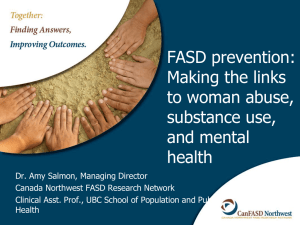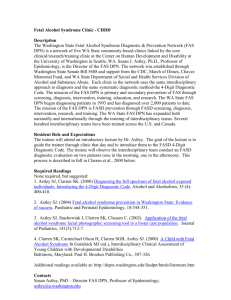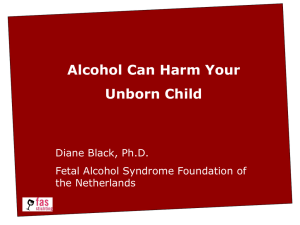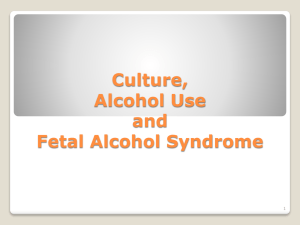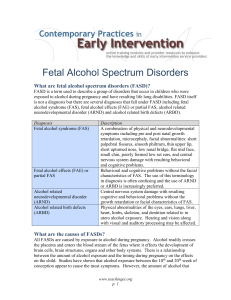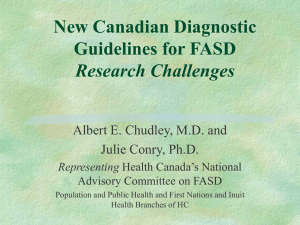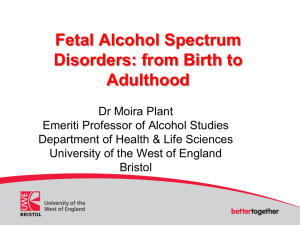(FAS) and Fetal Alcohol Spectrum Disorders (FASD)
advertisement
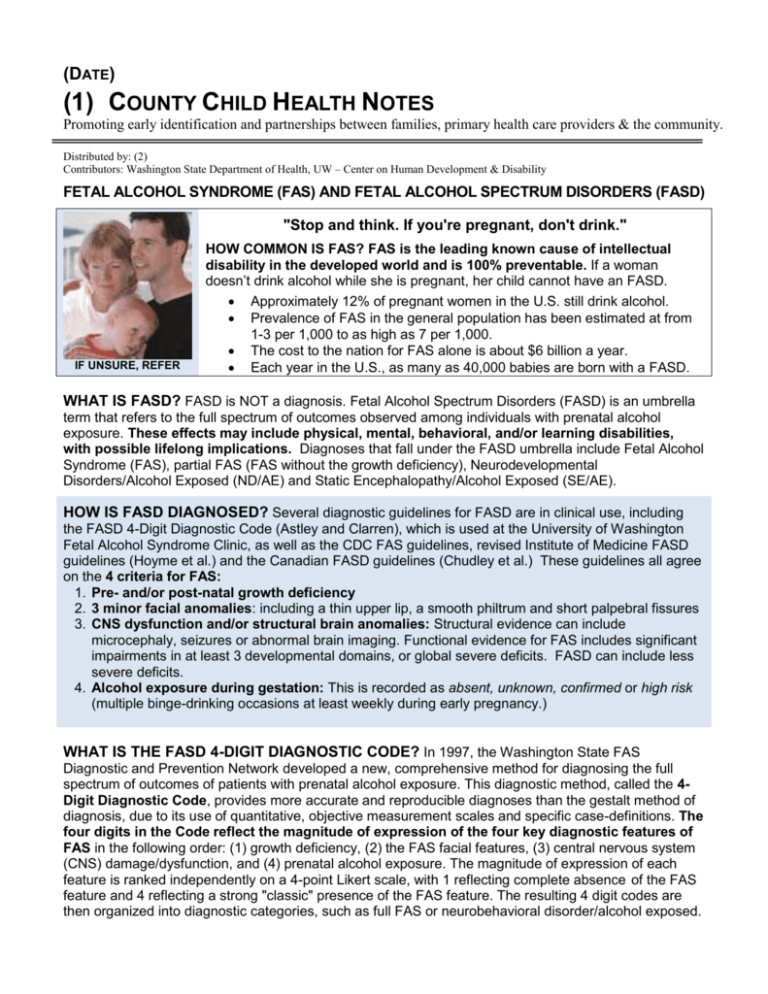
(DATE) (1) COUNTY CHILD HEALTH NOTES Promoting early identification and partnerships between families, primary health care providers & the community. Distributed by: (2) Contributors: Washington State Department of Health, UW – Center on Human Development & Disability FETAL ALCOHOL SYNDROME (FAS) AND FETAL ALCOHOL SPECTRUM DISORDERS (FASD) "Stop and think. If you're pregnant, don't drink." IF UNSURE, REFER HOW COMMON IS FAS? FAS is the leading known cause of intellectual disability in the developed world and is 100% preventable. If a woman doesn’t drink alcohol while she is pregnant, her child cannot have an FASD. Approximately 12% of pregnant women in the U.S. still drink alcohol. Prevalence of FAS in the general population has been estimated at from 1-3 per 1,000 to as high as 7 per 1,000. The cost to the nation for FAS alone is about $6 billion a year. Each year in the U.S., as many as 40,000 babies are born with a FASD. WHAT IS FASD? FASD is NOT a diagnosis. Fetal Alcohol Spectrum Disorders (FASD) is an umbrella term that refers to the full spectrum of outcomes observed among individuals with prenatal alcohol exposure. These effects may include physical, mental, behavioral, and/or learning disabilities, with possible lifelong implications. Diagnoses that fall under the FASD umbrella include Fetal Alcohol Syndrome (FAS), partial FAS (FAS without the growth deficiency), Neurodevelopmental Disorders/Alcohol Exposed (ND/AE) and Static Encephalopathy/Alcohol Exposed (SE/AE). HOW IS FASD DIAGNOSED? Several diagnostic guidelines for FASD are in clinical use, including the FASD 4-Digit Diagnostic Code (Astley and Clarren), which is used at the University of Washington Fetal Alcohol Syndrome Clinic, as well as the CDC FAS guidelines, revised Institute of Medicine FASD guidelines (Hoyme et al.) and the Canadian FASD guidelines (Chudley et al.) These guidelines all agree on the 4 criteria for FAS: 1. Pre- and/or post-natal growth deficiency 2. 3 minor facial anomalies: including a thin upper lip, a smooth philtrum and short palpebral fissures 3. CNS dysfunction and/or structural brain anomalies: Structural evidence can include microcephaly, seizures or abnormal brain imaging. Functional evidence for FAS includes significant impairments in at least 3 developmental domains, or global severe deficits. FASD can include less severe deficits. 4. Alcohol exposure during gestation: This is recorded as absent, unknown, confirmed or high risk (multiple binge-drinking occasions at least weekly during early pregnancy.) WHAT IS THE FASD 4-DIGIT DIAGNOSTIC CODE? In 1997, the Washington State FAS Diagnostic and Prevention Network developed a new, comprehensive method for diagnosing the full spectrum of outcomes of patients with prenatal alcohol exposure. This diagnostic method, called the 4Digit Diagnostic Code, provides more accurate and reproducible diagnoses than the gestalt method of diagnosis, due to its use of quantitative, objective measurement scales and specific case-definitions. The four digits in the Code reflect the magnitude of expression of the four key diagnostic features of FAS in the following order: (1) growth deficiency, (2) the FAS facial features, (3) central nervous system (CNS) damage/dysfunction, and (4) prenatal alcohol exposure. The magnitude of expression of each feature is ranked independently on a 4-point Likert scale, with 1 reflecting complete absence of the FAS feature and 4 reflecting a strong "classic" presence of the FAS feature. The resulting 4 digit codes are then organized into diagnostic categories, such as full FAS or neurobehavioral disorder/alcohol exposed. WHAT IS THE FETAL ALCOHOL SYNDROME DIAGNOSTIC AND PREVENTION NETWORK (FAS DPN)? FAS DPN is a network of Washington State community-based interdisciplinary FASD diagnostic clinics linked by the core clinical/research/training clinic at the Center on Human Development and Disability at the University of Washington in Seattle, WA. Each clinic in the network uses the same interdisciplinary approach to diagnosis and the same systematic diagnostic method: the 4-Digit Diagnostic Code. The mission of the FAS DPN is primary and secondary prevention of FAS through screening, diagnosis, intervention, training, education, and research. The WA State FAS DPN began diagnosing patients in 1993 and has diagnosed over 2,000 Washington patients to date. HOW DO I GET A PATIENT EVALUATED FOR FAS? To request a diagnostic evaluation, call the University of Washington FAS DPN Clinic at (206) 598-7666. Your request will be forwarded to the clinic closest to you. Clinics are located in Everett, Seattle, Yakima, Pullman and Spokane. Other alternatives for diagnosis include referral to a developmental pediatrician or child development clinic. International FASD Awareness Day is September 9! References: Astley, Clarren. Diagnosing the full spectrum of fetal alcohol-exposed individuals: introducing the 4-digit diagnostic code. Alcohol. 2000; 35(4): 400-410. Hoyme, et al. A practical clinical approach to diagnosis of fetal alcohol spectrum disorders: clarification of the 1996 Institute of Medicine criteria. Pediatrics. 2005; 115(1):39-47. Chudley, et al. Fetal Alcohol spectrum disorder: Canadian guidelines for diagnosis. CMAJ. 2005; 172 (5 Suppl);S1-S21. Bertrand, et al. FAS Prevention Team, Division of Birth Defects and Developmental Disabilities, national Center on Birth Defects and Developmental Disabilities, Centers for Disease Control and Prevention (CD). Guidelines for identifying and referring persons with Fetal Alcohol Syndrome. MMWR Rec. Rep. 2005; 54 (RR-11):1-14. Resources: www.fasdpn.org www.nofas.org www.nofaswa.org www.cdc.gov/fasd www.fasdcenter.samhsa.gov Washington State diagnostic clinics National Organization on Fetal Alcohol Syndrome (NOFAS) State of WA affiliate- includes family support CDC information Substance Abuse and Mental Health Services Administration Special Needs Information and Resources: Local: (3) (4) Regional: WithinReach Family Health Hotline Early Support for Infants and Toddlers Program (ESIT) (formerly ITEIP) Parent to Parent Support Programs of Washington National/ Internet: 1-800-322-2588, 1-800-833-6388 TTD www.withinreachwa.org http://del.wa.gov/development/esit/ Main number: (360) 725-3500 (800) 821-5927 www.arcwa.org/parent_to_parent.htm Washington State Medical Home http;//www.medicalhome.org American Academy of Pediatrics AAP Developmental and Behavioral Pediatrics American Academy of Family Physicians CDC Act Early Family Village (Extensive family resources for CSHCN) Family Voices (Links to national and state family support networks) www.aap.org www.dbpeds.org www.aafp.org www.cdc.gov/ncbddd/actearly/index.html www.familyvillage.wisc.edu www.familyvoices.org
